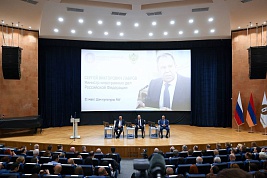Remarks by the head of the Russian delegation, Permanent Delegate of the Russian Federation to UNESCO Alexander Kuznetsov during a general policy debate at the 204th session of the UNESCO Executive Board, Paris, April 10, 2018
Mr Chairperson,
Madam Director-General,
Madam President of the General Conference
Colleagues,
The current session of UNESCO’s supreme body is taking place at a fairly weighty moment in the life of our organisation. It is necessary to develop constructive working relations between the Executive Board and the Director-General, outline a common vision for UNESCO’s future, and map out priority areas of reform in the organisation with a view to making it more efficient and increasing the importance of its unique mandate within the United Nations.
Prerequisites are in place for successful joint efforts. We note with satisfaction that the Director-General managed to substantially improve UNESCO’s financial standing in a short span of time. We consider quite interesting the concept of “strategic transformation” presented by Audrey Azoulay. Naturally, it is necessary to figure out specific details but I would like to say straight away – we should not forget the intergovernmental character of our organisation. For any reform to be successful, it must be based on the opinion of the member-countries and their active involvement in the process. Consolidating the practice of open-ended consultations in person will improve the quality of dialogue between the member-countries and the Secretariat. We are ready for constructive cooperation under these principles.
As we said more than once at past sessions, the key to reforming UNESCO is not a procedural issue, be it a change of rules for electing the Director-General or rotation of Executive Board members. It lies in the improvement of its programme activities. Its spectrum cannot be expanded without end due to financial limitations, so its focus should be on clear-cut priorities in the areas of its competence. Importantly, the organisation should not lose its capacity, in particular, in fundamental sciences as a basis of applied research.
Concentrating efforts also implies that UNESCO should give up activities that are contrary to its mandate. It is necessary to remove from the agenda politicised issues that cannot be resolved under its auspices by definition and that should be reviewed at other UN venues. At the same time we believe that UNESCO should not stand by while crude violations of its principles and values are committed.
I am referring to the Convention against Discrimination in Education. Its provisions have been flagrantly violated by the adoption of the law on education by Ukraine, repeal of the law on the foundations of state language policy, and amendments to the law on education in Latvia.
While we are discussing here in UNESCO the ideas of peace and non-violence, inclusiveness and equal access to education for all, these countries prohibit instruction in minority languages at their schools. The lawful interests of over one-third of the population are being infringed in Latvia, while Kiev is discriminating against not only Russian but also languages of several other countries whose representatives are present in this hall. We hope that UNESCO will give an objective public assessment of these actions.
Mr Chairperson,
We are satisfied with the close attention of the Director-General to a very important area of UNESCO’s competence – protection and restoration of the cultural heritage that was damaged by hostilities in the Middle East. This is the message of UN Security Council Resolution 2347. It is good that the Director-General is paying attention to the restoration of the old city of Mosul in Iraq. At the same time we hope that Syria’s world cultural heritage that does not have any political relevance will also become a major priority for the Director-General. We are calling on UNESCO to step up its activities and joint the efforts to restore cultural monuments damaged by terrorists in Palmira and Aleppo.
Colleagues,
We are watching with great concern the growth of manifestations of racism, aggressive nationalism and religious intolerance throughout the world. It has reached the point that in Europe, which sacrificed millions of lives to defeat Nazism, some people are rewriting history, whitewashing Hitler’s collaborators and fighting against monuments to the heroic liberators. We consider it necessary to pay close attention to this issue without any delay and ensure there is a legal framework for curbing such actions.
Our urgent task today is to preserve interethnic and interreligious accord and create conditions for peaceful mutually respectful co-existence of different cultures and ethnic groups. We hope that by pooling efforts we will make better use of the creative potential of our organisation for the sake of peace, stability, development and protection of cultural diversity and intransient moral values.
Thank you for your attention.
